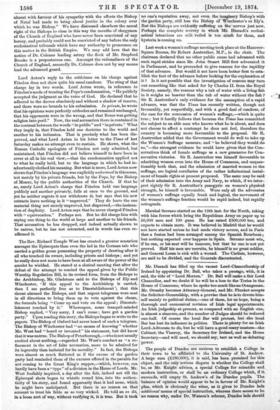The Rev. Richard Temple West has created a greater sensation
amongst the Episcopate than even the lad in the German tale who carried a golden goose possessing the property of drawing after it all who touched its owner, including priests and bishops ; and yet he really does not seem to have been at all aware of the power of the amulet he wielded. He stated at a clerical meeting that after the defeat of the attempt to rescind the appeal given by the Public Worship Regulation Bill, in its revised form, from the Bishops to the Archbishop, Mr. Gladstone said to the Bishops of Ely and Winchester, If this appeal to the Archbishop is carried, then I am perfectly free as to Disestablishment '; that this threat alarmed the Bishops, and that urgent telegrams were sent in all directions to bring them up to vote against the clause, the formula being " Come up and vote on the appeal ; Disestab- lishment touched by it." Whereupon, some tranquil-minded Bishop replied, " Very sorry, I can't come ; have got a garden party." Upon reading this story, the Bishops began to write to the papers. The Bishop of Oxford had never heard of such a telegram. The Bishop of Winchester had "no means of knowing" whether Mr. West had "heard or invented" his statement, but did know that it was untrue. The Bishop of Peterborough,—who is not usually excited about nothing,—regarded Mr. West's conduct as " a re- finement in the art of false accusation, more to be admired for its ingenuity than imitated for its morality." In fact, the Bishops were almost as much fluttered as if the excuse of the garden party had reminded them of the excuses offered in the parable for not coming to the Great King's supper,—Which, however, can hardly have been a "type" of a.division in the House of Lords. Mr. West foolishly inquired, a day after the fair, indeed not till the Episcopal shots began to whistle round him, into the authen- ticity of his story, and found apparently that it had none, which he might have anticipated. But there is no reason on that account to treat his fable as so very wicked. He told an on dit, in a loose sort of way, without verifying it, it is true. But it took no one's reputation away, not even the imaginary Bishop's with the garden party, still less the Bishop of Winchester's or Ely's. But the Bishops are evidently suffering on the nerves just now. Perhaps the complete secrecy in which Mr. Disraeli's ecclesi- astical intentions are still veiled is too much for them, and hysteria is coming on.






































 Previous page
Previous page